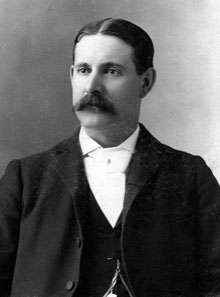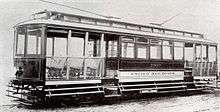Tirey L. Ford
Tirey Lafayette Ford (December 29, 1857 – June 26, 1928) was an American lawyer and Republican politician who served as a California State Senator and the 18th Attorney-General of California. He acted as General Counsel for the United Railroads in San Francisco. He is known in California politics and for his Republican speeches, including "A Tribute to William McKinley" and "Speech on National Issues." Ford and his American ancestors have a long tradition in farming.
Tirey Lafayette Ford | |
|---|---|
 | |
| 18th California Attorney General | |
| In office 1899–1902 | |
| Governor | Henry Gage |
| Preceded by | William F. Fitzgerald |
| Succeeded by | Ulysses S. Webb |
| Sierra County, District Attorney | |
| In office 1888–1890 | |
| California State Senator | |
| In office 1892–1896 | |
| Personal details | |
| Born | December 29, 1857 |
| Died | June 26, 1928 (aged 70) San Francisco, California |
| Nationality | American |
| Political party | Republican |
| Spouse(s) | Mary Emma Byington |
| Children | Byington Ford, Mary Relda Ford, Tirey Lafayette Ford Jr. |
| Profession | Attorney, Politician |
| Signature | |
History
The Ford family came to America in 1700 by French Huguenots, who located in Virginia. One of the first Ford families was Pierre Fauré (also known as Peter Ford), whose family settled along the James River in Virginia. His great-grandfather, Jacob Lafayette Ford, was with General George Washington at Yorktown, Virginia when the surrender of Lord Cornwallis occurred during the American Revolutionary War. His grandfather, Pleasant Thomas Ford, was with General William Henry Harrison in the Indian campaigns that made the Battle of Tippecanoe famous.[1] [2]
Early life

Ford was born on a farm in Monroe County, Missouri, the son of Jacob Harrison Ford and Mary Winn Abernathy. He went to the district county school from 1863-1873 and graduated from high school in 1876.[3]
In 1877, at the age of 19, Ford left Missouri and took an immigrant train to Colusa County, California. For three years, he worked on his uncle (Hugh J. Glenn)'s ranch; Hugh Glenn was a Democratic candidate for Governor. Ford became a student in the law office of Colonel Park Henshaw in Chico, California.[1] Ford was admitted to the California bar in August 1882.[4]
In 1882, Ford moved to Oroville to practice law in partnership with Senator Albert F. Jones, under the firm name of Jones & Ford. This partnership lasted for one year when Ford moved to Downieville, California, the county seat of Sierra County, where he practiced law under the firm name of Smith & Ford. He specialized in mining law. Tirey stayed in Downieville for eight years.[3]
Marriage and children

On February 1, 1888, Ford married Miss Mary Emma Byington in Downieville, California. She was the sister of Lewis Francis Byington and daughter of Lewis Byington, one of the leading pioneers of Sierra County, California.
They had three children:
- Mary Relda Ford (1888-1951) Married Samuel Finley Brown Morse on February 18, 1919.
- Byington Ford (1890-1985) Prominent Monterey Peninsula real estate developer.
- Tirey Lafayette Ford Jr. (1898-1972) Codeveloped the Carmel Valley Airport.
Ford moved the family to San Francisco in 1992. Relda, Byington, and Tirey Jr. attended high schools in San Francisco. They lived on 3800 Clay Street in San Francisco.
Political life
District Attorney
In 1888, Ford was elected as District Attorney of Sierra County on the Republican ticket by the largest majority than any candidate for that office in 17 years. He re-elected in 1890 to the office without opposition, the Democrats making no nomination against him.[5]
State Senator
Ford became Republican State Senator in 1892 and 1895 for California's 3rd State Senate district, Plumas, Sierra, and Nevada Counties.[6] On March 23, 1893, Senator Ford introduced two bills known as the Ford's Mining Bills, Senate Bill No. 50, which would allow hydraulic mining where it can be done without material injury to the navigable rivers, and Senate Bill No. 389, which would appropriate $250,000 for building restraining dams, provided by the United States Government.[7]
State Board of Harbor Commissioners
He was appointed attorney to the State Board of Harbor Commissioners in 1894, which office he held until elected Attorney General for the state of California in 1898.[8] Ford solved a difficult legal dispute over ownership of an area known as Channel Street located in the San Francisco's harbor leading to the bay. A judgment gave this land for public use to the city of San Francisco.[9]
Union League Club President
In 1898, Ford was elected president of the Union League Club in San Francisco. The Republican club extended fellowship to distinguished guests of the city. Annual meetings were often held at the Palace Hotel in San Francisco.[10]
California Attorney General

He served as the 18th California Attorney General 1899-1902. One of his noteworthy acts was the reversal of a decision regarding the inheritance tax on the Leland Stanford estate that converted $250,000 to public schools of San Francisco.[3] He resigned as Attorney General in order to become General Counsel for the United Railroads (URR) of San Francisco.[11] [12]
State Board of Prisons
In 1905, Governor George Pardee selected Ford to be the State Prison Director. Ford wrote a book called California State Prisons: their history, development and management, published in 1910.[13] As director, he created a special bureau for paroled prisoners.[3]
Private life
California Miners' Association
On March 7, 1892, Ford was elected President of the California Miners' Association. He was a successful mining lawyer in Downieville that was engaged as counsel by the Miners' Association to conduct important cases.[14] Ford went to Washington in January 1896 to expedite the passage through Congress for bills to appropriate money for the construction of works to protect the rivers and streams of California.[15]
United Railroads


In August 1902, Ford was appointed general counsel for the United Railroads of San Francisco.[3] His knowledge of railroad law as of other departments of jurisprudence was comprehensive and accurate, and he stands today as one of the foremost representatives of the legal interests of California.[1] [16]
As attorney for URR, he was involved in a bribery scandal in 1906, but was later found to be innocent. The bribery scandal was one of the many San Francisco graft trials, which included Mayor Eugene Schmitz and attorney Abe Ruef, who were receiving bribes.[17]
Adolphus Frederic St. Sure joined Ford's law firm in San Francisco.[18] During the 1906 San Francisco earthquake and fire, Ford became a member of Mayor Eugene Schmitz's Committee of Fifty.
Ford was a member of the Pacific-Union Club, Bohemian Club, Union League Club of San Francisco, Commonwealth Club of California, Press, Transportation, Merchants Institute, Amaurot, and Southern Clubs, and as a Knight Templar.[3]
Retirement

After his retirement, Ford took up historical studies and literary pursuits. In 1926 he published the well-received novel, Dawn and the Dons: The Romance of Monterey, with vignettes and sketches by artist Jo Mora. The book was reviewed in the California Historical Society Quarterly, which said: "It is a pleasure to read a book which has been a labor of love for the author. His sketches are finely artistic and, further, they are correct historically." [19] [20]
Tirey was an avid golfer and won the Club Shield of the Presidio Golf Club in a tournament on January 3, 1916.[21] His hobby for reducing everything to a system led him to keep a record of his first one thousand rounds on the links.[2] On February 19, 1925, Ford was among the 68 charter members of the Monterey Peninsula Country Club.[22]
Death and funeral
On June 26, 1928, Ford woke up at the usual time and ordered breakfast sent up to his room at the Pacific-Union Club in San Francisco. When the waiter arrived with his tray he found Ford dead in his bed due to a sudden heart attack. He was 70 years old. Ford's was liked and admired by all who knew him.[23]
A funeral service was held at 10 o'clock at Gary's Chapel on Divisadero Street at Post in San Francisco. He was interred at the family mausoleum, at the Holy Cross Cemetery in Colma, California.[24]
Books
Articles
References
-
Irvine, Leigh Hadley (1905). A History of The New California. New York: The Lewis Publishing Company. p. 469.
Tirey L. Ford.
- Burdette, Robert J (1910). American Biography & Genealogy, California Edition, Volume I. Chicago, New York: The Lewis Publishing Company. pp. 201-207.
- Press Reference Library, Notables of the West. New York: International News Service. 1915. p. 124.
- "The State Bar of California". the State Bar. Retrieved May 17, 2014.
- Sacramento Daily Union, Volume 84, Number 144, 4 February 1893
- California State Capitol Museum
- Sacramento Daily Union, Vol. 85, No., 26, March 23, 1893
- San Francisco Newspaper, June 26, 1928
- The Pacific Reporter, Volume 62, September 6 – Dec. 27, 1900
- "TIREY L. FORD TO LEAD THEM". San Francisco Call, Volume 83, Number 43. 12 January 1898. Retrieved 31 October 2017.
- "Tirey L. Ford Resigns and US Web Will Succeed Him" (PDF). San Francisco Call. September 12, 1902. Retrieved 2013-04-07.
- Tirey L. Ford, 18th Attorney General
- Los Angeles Herald, Volume 33, Number 20
- The Sacramento Daily Union, Volume 83, Number 13, March 7, 1892
- The San Francisco Call, Volume 79, Number 13, 22
- "Attorney-general Resigns Position", Sept. 12, 1902, San Francisco Chronicle
- Bean, Walton (1974). "The Trials of Tirey L. Ford". Boss Ruef's San Francisco: The Story of the Union Labor Party, Big Business, and the Graft Prosecution. Berkeley: University of California Press. pp. 240, 240–255. ISBN 9780520000940.
- Judge Adolphus Fredrick St. Sure
- Purdy, Helen Throop (1927). "Dawn and the Dons. The Romance of Monterey by Tirey L. Ford, Jo Mora". California Historical Society Quarterly. California Historical Society Quarterly, Vol. 6, No. 2 (Jun., 1927), pp. 195-196. 6 (2): 195–196. JSTOR 25177883.
- WorldCat Reference Dawn and the dons : the romance of Monterey
- "Tirey L. Ford Captures Presido Club Shield". San Francisco Chronicle. San Francisco. January 3, 1916.
- Durein, Ted (1975). The First Fity Years 1925-1975. California: Monterey Peninsula County Club. p. 14. OCLC 50546609.
- "Tirey L. Ford Dies at Bay". Colusa Herald. California. 1928. Retrieved 2020-02-18.
- "Index to Politicians". The Political Graveyard. Retrieved 2020-02-18.
- Tirey L. Ford (March 1, 2007), Dawn Of The Dons, Kessinger Publishing, LLC, ISBN 9781432516307, OL 11930655M, 1432516302
- Tirey Lafayette Ford (1910), California state prisons, San Francisco: [The Star Press], OL 23010409M
- Tirey L. Ford (December 1, 1896). Overland Monthly and Out West Magazine. San Francisco: Overland Monthly Publishing Company.
- Tirey L. Ford (1902). Notable speeches by Notable Speakers of the Greater West. San Francisco: The Whitaker and Ray Company.
- Tirey L. Ford (1917), The City Imperishable, San Francisco: Western Press Association
External links
- Tirey L. Ford at the Henderson Family website
- Tirey Lafayette Ford Biography
- Henderson, Gregory F. (2018). Tirey Lafayette Ford. CreateSpace. ISBN 9781983976926.
- Tirey L. Ford at Find a Grave
| Legal offices | ||
|---|---|---|
| Preceded by William F. Fitzgerald |
California Attorney General 1899–1902 |
Succeeded by Ulysses S. Webb |
| Preceded by |
California's 3rd State Senate district 1892–1897 |
Succeeded by |
